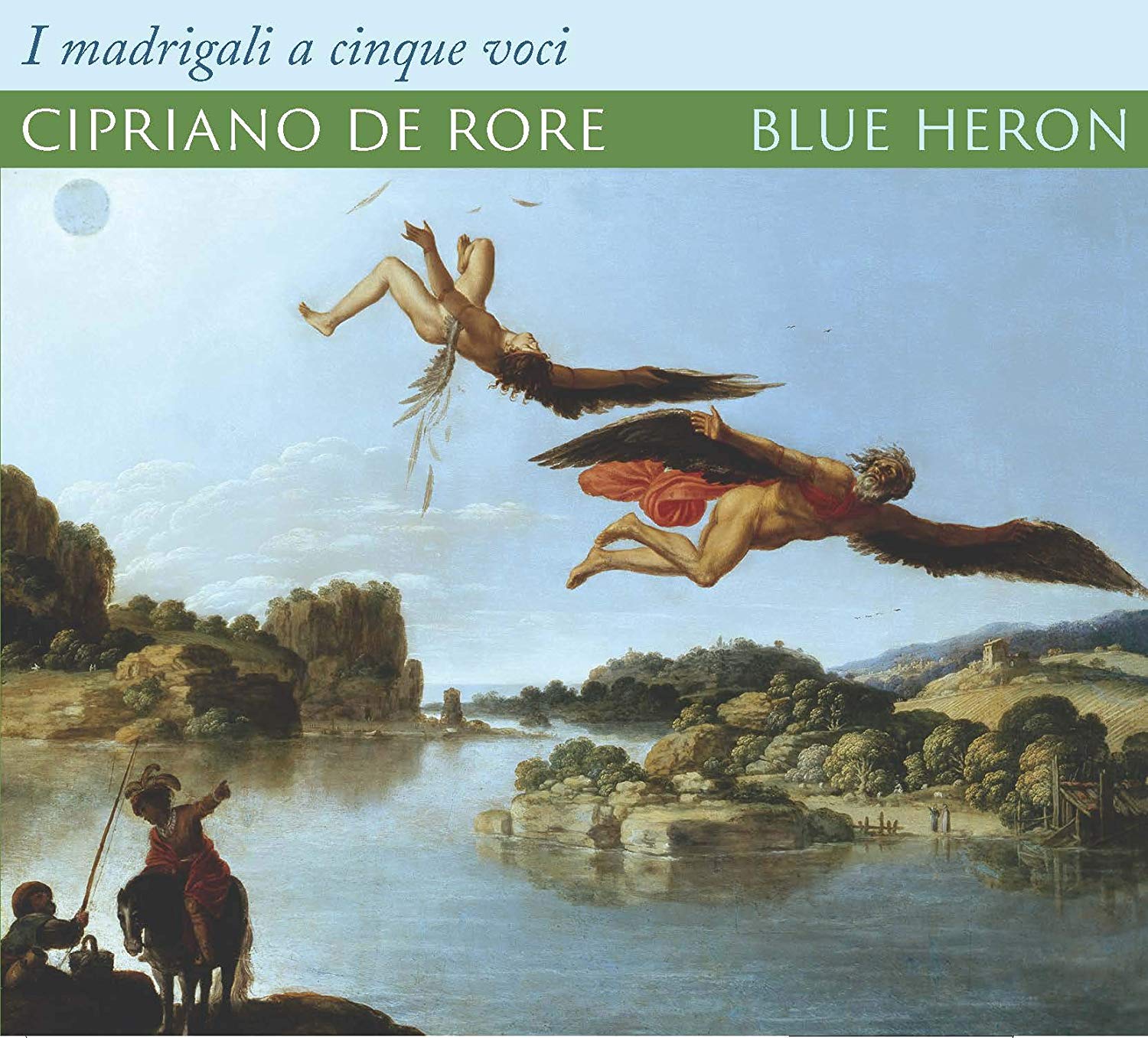da Rore: I madrigali a cinque voce
Blue Heron
120:49 (2 CDs in a card folder)
Blue Heron BHCD 1009
de Rore: Missa “Vivat Felix Hercules”
Weser-Renaissance Bremen
69:47
cpo 777 989-2
Blue Heron’s recordings of music from the Peterhouse Partbooks resulted in five compact discs which received acclaim and prizes, including the first and so far only instance of the Gramophone Early Music Award being made to an American vocal ensemble. It was therefore with a great sense of anticipation that their next major project, Cipriano de Rore’s complete book of madrigals in five parts, 1542, has been awaited. Unsurprisingly they deliver in spades, both in performance and in presentation, with a booklet including erudite but readable and informative essays by Jessie Ann Owens and Scott Metcalfe. Rore comes over as a natural composer of madrigals, and Blue Heron have the versatility to do his music ample justice. Perhaps sensitive to prospective purchasers contemplating the prospect of up to twenty madrigals in identical scoring being sung off the reel, Blue Heron preface each madrigal with the original texts, the majority by Petrarch, being read by Alessandro Quarta; suffice to say he declaims them as effectively as Blue Heron subsequently sing them. Rore’s 1542 collection was famously innovative, with its intense engagement between the music and the words unprecedented in secular vocal music, and it set the standard, including the use of five vocal parts, for the more serious type of madrigal till the seventeenth century. Basically his madrigals are a fusion of the Franco-Flemish polyphonic style which, as we hear on Weser-Renaissance’s disc, he himself exploited in his sacred music, with the lighter, airier, Italian style. Whereas some such fusions simply refuse to “fuse” in the wrong hands, Rore’s collection exhibits a high standard throughout. This makes it very hard to single out individual works to recommend. Thanks to the versatility and sensitivity of Blue Heron’s singers, and to Scott Metcalfe – the most stylish conductor that I can remember seeing (in Cambridge, 2016) – every work receives detailed individual attention. A work such as Quel sempre acerbo et honorato giorno could pass superficially as a Franco-Flemish motet, while Perseguendomi Amor al luogo usato comes across as what posterity would come to regard as typically madrigalian.

Weser-Renaissance’s disc is a different kettle of fish. Partly this reflects Rore’s own versatility as a composer. Although nothing quite beats the frisson of a live performance, one benefit of recordings is that one can listen to performances more than once and, if desired, do so soon after the first hearing, as many times as one wants. This certainly worked for me regarding Weser-Renaissance’s disc. At a first hearing I thought that the performances were inexpressive and stodgy, and the music, especially the Mass, turgid. Unwilling to sound off after a single unsatisfactory hearing, I listened again and the fog began to lift. Come a third helping I had reached my current state of admiration for both the singing and the music. The catalyst occurred during the second session with the electrifying music set to the words “miserere nobis” in Agnus I and II, and again to “dona nobis pacem” in Agnus III. Now I found myself able to listen in a different way, to hear the light and shade in the motets, and to appreciate further impressive passages of writing in Pater noster and especially Da pacem, Domine. In critical mode, I still feel that in the Gloria and Credo of his Mass, Rore is somewhat of a prisoner to his motto “Vivat felix Hercules secundus, dux Ferrariae quartus” which is treated as a Soggetto cavato during the Mass, in the manner of Josquin’s Missa Hercules dux Ferrariae. But overall it is a fine work, interspersed with several estimable motets, featuring imaginative scoring expressed through expert polyphony with judiciously placed sections of homophony. Weser-Renaissance perform it all sonorously ensuring clarity within Rore’s sumptuous textures.
Richard Turbet
Click HERE to buy the Blue Heron CD on amazon.
Click HERE to buy the Weser-Renaissance MP3 recording on amazon.
